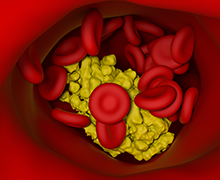Series Overview
Familial hypercholesterolemia (FH) is a genetic disorder marked by high levels of circulating low-density lipoprotein cholesterol (LDL-C), leading to increased risk of premature atherosclerotic cardiovascular disease (ASCVD). Individuals with FH frequently remain undiagnosed, resulting in poor outcomes and failure to diagnose family members. Even once diagnosed, the preferred treatment options can vary based on FH genotype, as well as baseline and target LDL-C levels. The following activity series will provide an opportunity for learners to test their knowledge, as well as learn from our expert faculty through an interactive format and progressive case study. The series as a whole will cover topics related to FH pathophysiology, diagnostic criteria for FH, the importance of genetic and cascade testing, and best practices for incorporating lipid-lowering therapies into treatment regimens for individuals with FH.


Test Your Might in Familial Hypercholesterolemia


Exercising Best Practices in Familial Hypercholesterolemia


Going the Distance in Familial Hypercholesterolemia







